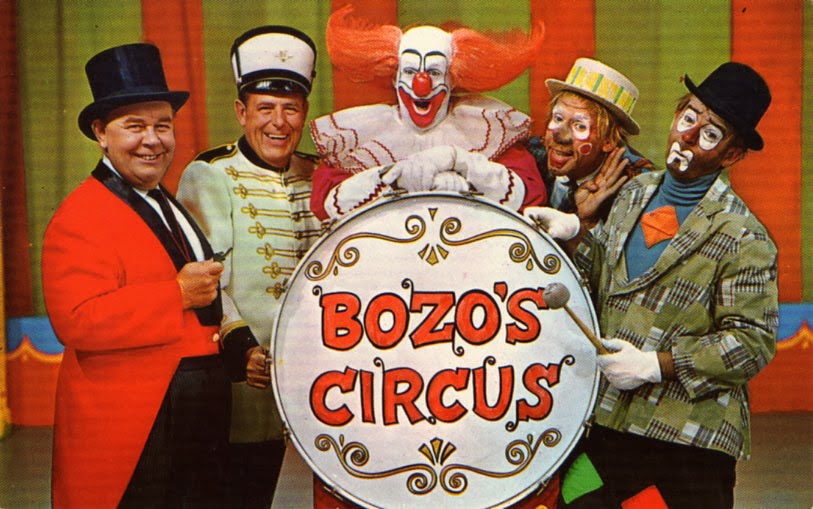I’ve written before about
the communal nature of Comfort TV, and how it is something we share no matter where we lived. But some classic
TV series and characters were strictly regional sensations – Wallace
and Ladmo, Garfield Goose, The Magic Garden. They sustain a deep nostalgic appeal for those who
grew up with them, but are virtually unknown to the rest of the country.
Which brings me to Bozo’s
Circus. The series was a television
phenomenon in Chicago, where I grew up. But at one time there were Bozo shows
on more than 180 local TV stations, all sharing the same basic format but with
dozens of different actors playing the world’s most famous clown.
It was, at the time, an
unprecedented franchising model that proved remarkably successful. And it was
conceived by Larry Harmon, the first man to don the character’s red wig and
size 83AAA shoes.
 |
| Bozo and Larry Harmon |
I interviewed Mr. Harmon in
1996. Even over the telephone it was clear that his nearly 40-year connection to Bozo had lost none of
its enthusiasm. He told me how he first became aware of the character from a
series of children’s records released by Capitol in the 1940s. They were so
successful that Capitol needed someone to play Bozo at personal appearances.
Harmon auditioned and won the part, then bought the rights to the character in
1954.
“I didn’t have two nickels
to rub together, but I borrowed a million dollars and did it,” he recalled.
After producing more than
150 Bozo cartoons, he launched the first live-action Bozo show in 1956. The
Chicago version debuted on WGN in 1959, and was renamed Bozo’s Circus in 1961. The remarkable Bob Bell played Bozo from
the first live-action episode until he retired from the role in 1984.
If you didn’t live in
Chicago in the 1960s and ‘70s, it’s hard to explain the unlikely but astounding
popularity of this low-budget one-hour show, which became as much a part of the
city’s cultural fabric as the Sears Tower and baseball at Wrigley Field.
Tickets for the studio
audience, which held only 200 people, were harder to get than Bulls playoff
seats in the Michael Jordan era. Newly married couples applied for tickets
before their honeymoon, so their not-yet-born children might have a chance to
see the show when they were 7 or 8 years old. By 1980, the waiting list had
reached 11 years, and was frozen for the next decade. When the moratorium was
lifted in 1990, WGN opened a 900-number Bozo ticket hotline for five hours.
More than 25 million calls poured in.
So what was all the fuss
about? Looking back it’s rather difficult to explain. Bozo’s Circus offered songs, comedy skits, games and a guest
circus act, usually acrobats or prancing dogs. Each episode ended with the
audience joining the cast in the Grand March, a parade that doubled as a fast
way to clear the studio. It looks pretty cheesy now, but I still remember how I
rarely missed an episode.
I had a ringside seat for
Bozo-mania, as my parents owned the company that manufactured a home version of
the Grand Prize Game, one of the show’s most popular features. That connection
got me some pretty big perks under the big top, including a chance to meet the
show’s beloved ringmaster, Ned Locke, and Roy Brown, who played Bozo’s
sidekick, Cookie the cook.
It did not, however, secure
my financial future. In fact, my folks nearly went
bankrupt and had to fold
the business. For whatever reason, the appeal of Bozo didn’t always translate
well outside of the show itself.
Bozo’s Circus ended its Chicago run in 2001, after more than 40
years on the air. Today’s kids probably wouldn’t have a clue about a character
who was once a hotter ticket than Springsteen.
Looking back now I’m still
trying to find a way to explain how the series achieved such profound audience
loyalty and affection. Perhaps, in this case, it’s best not to look too close,
lest we start to see through the magic. For me the best explanation was given
by a 6 year-old boy, who attended a personal appearance on the occasion of
Bozo’s 50th anniversary in show business.
“I love you, Bozo!” he shouted at his favorite clown.
“Why do you love Bozo?”
asked his mother.
“Bozo is Bozo,” he said.


.jpg)

No comments:
Post a Comment